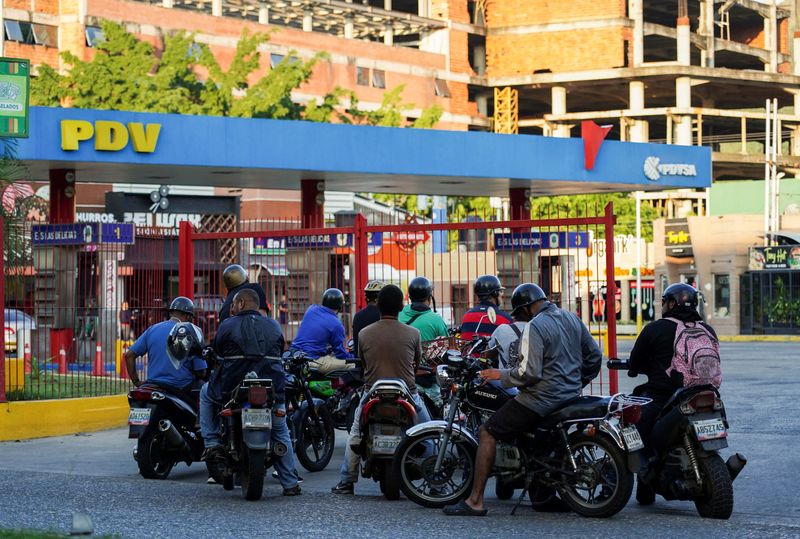By Tibisay Romero and Mircely Guanipa
VALENCIA/MARACAY, Venezuela (Reuters) -Long lines for motorists at Venezuela's refueling stations are back due to repeated outages at state oil company PDVSA's refineries and a lack of diesel and gasoline imports.
In 2020 and again in 2021, drivers had to line up for days to get gasoline and farmers halted work because of insufficient diesel. The shortages had eased earlier this year as imports of Iranian crude boosted refinery output.
But Venezuela's refining network again is operating at a fraction of its capacity due to problems with deep-conversion units essential for motor fuel production, according to workers, leading to a new round of shortages.
"I had more than 100 cars before me in the line when I arrived in the afternoon. Right after midnight, the station ran out of gasoline," said Ramon Blanco, a 32-year-old who filled up the next day at another station. "I hope we don't go back to that terrible time when we had to line up for days."
Venezuela's central region has been most affected by the fuel scarcity, which has not yet reached the capital city Caracas. But lines also have reappeared in Falcon state, home of PDVSA's largest oil refineries.
At many stations, hundreds of motorcycle drivers - a common way of transportation in the country - circle every morning waiting for a chance to fill up. Some motorists said they worry about the dollar-denominated prices charged for the gasoline when supplies are available.
PDVSA did not reply to a request for comment. On Thursday, it said on Twitter operations would be extended at several central-region stations.
PERSISTENT OUTAGES
The fluid catalytic cracker at Venezuela's largest refinery, the 645,000-barrel-per-day Amuay in Falcon state, has been out of service since last week. It was the plant's third outage since July on power interruptions and unplanned maintenance. The unit has been offline for a total of 23 days this year.
Due to the situation in Amuay, part of the country's Paraguana refining complex, PDVSA made a big effort to restart the adjacent Cardon refinery's cracking unit - which had remained offline the whole year until this week - and the naphtha reformer, which was out of service three times this year.
Workers from Iran's state company Naftiran Intertrade Co (NICO) have been repairing and trying to revive PDVSA's 146,000-bpd El Palito refinery, the country's smallest.
Iran has supplied millions of barrels of oil this year to feed El Palito and other Venezuelan refineries and PDVSA has revamped its facilities' crude diet to keep them running amid a lack of lighter grades to produce motor fuel.
But unstable electricity has especially dogged Paraguana's twin refineries after at least three power blackouts and two minor fires hit the complex this year. At El Palito, a fire and a power outage have affected operations in recent months.
On Venezuela's eastern coast, two crude distillation units and a hydro-processing plant at the 187,000-bpd Puerto la Cruz refinery are in service, workers told Reuters.
"We are trying our best because we are under pressure to restart some plants for producing gasoline," said a worker from Amuay. "We know how dire the situation is out there."
